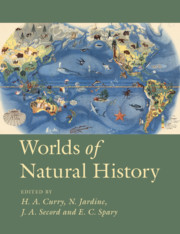Book contents
- Worlds of Natural History
- Advance praise for Worlds of Natural History
- Frontispiece
- Worlds of Natural History
- Copyright page
- Contents
- Plates
- Figures
- Notes on contributors
- Acknowledgements
- Introduction
- I Early modern ventures
- II Enlightened orders
- III Publics and empires
- IV Connecting and conserving
- Epilogue
- Notes
- Index
- Plate Section (PDF Only)
- References
Epilogue
Published online by Cambridge University Press: 13 December 2018
- Worlds of Natural History
- Advance praise for Worlds of Natural History
- Frontispiece
- Worlds of Natural History
- Copyright page
- Contents
- Plates
- Figures
- Notes on contributors
- Acknowledgements
- Introduction
- I Early modern ventures
- II Enlightened orders
- III Publics and empires
- IV Connecting and conserving
- Epilogue
- Notes
- Index
- Plate Section (PDF Only)
- References
- Type
- Chapter
- Information
- Worlds of Natural History , pp. 533 - 544Publisher: Cambridge University PressPrint publication year: 2018

